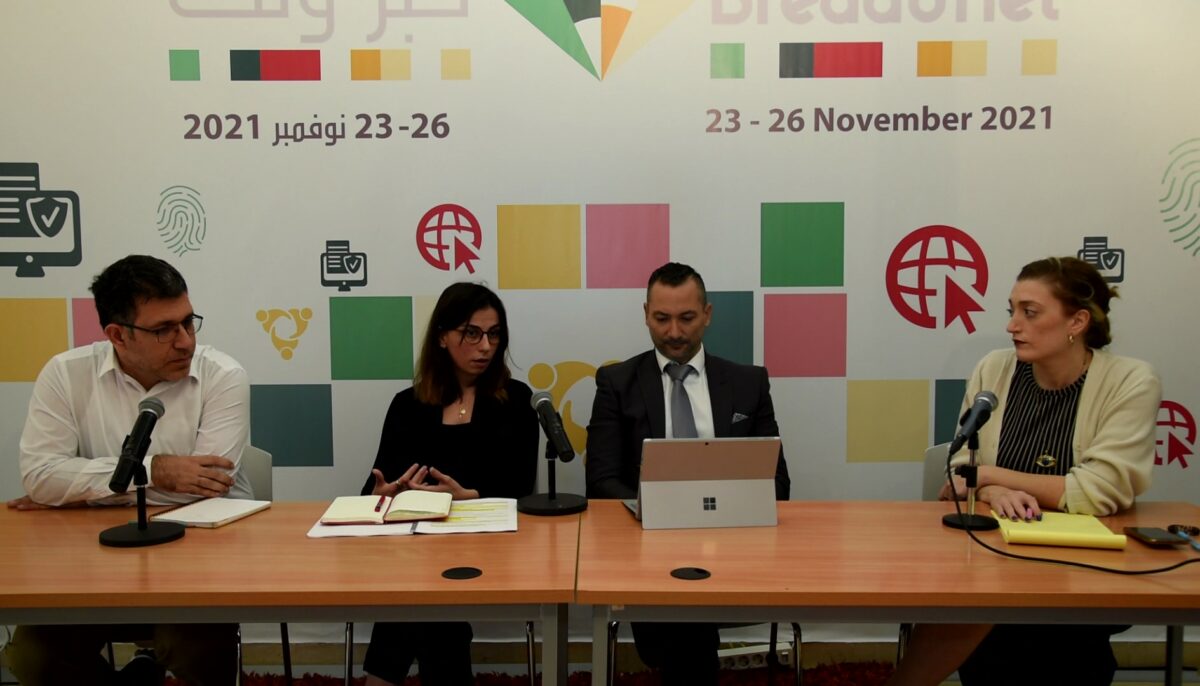Bread&Net returned for the fourth time last week, from 23 to 26 November, welcoming around 1000 participants from 74 countries to take part in the regional discourse on digital rights and freedoms in the Arabic-speaking world. Over the course of four days, technologists, organizers, researchers, lawyers, and journalists brought forth their ideas, concerns, insights, and recommendations in the four key areas of policy advocacy in difficult contexts, digital security in practice, technology as a resource and resistance communities.
Numerous conversations that took place during Bread&Net 2021 built upon an on-going critique of the current digital rights environment in Arabic-speaking countries. In over 90 critical discussions, in English and Arabic with translation and sign language translation in some sessions, Bread&Net addressed a wide range of issues that encompassed topics such as the documentation of digital rights abuses, re-envisioning the Santa Clara Principles, funding feminist AI technology, internet shutdowns in the region, data collection during Covid-19, alternative social media platforms, digital accessibility, mis/disinformation, human rights centered design, and cyberviolence against women journalists and the LGBTG+ community, among others. Our convening at Bread&Net brings diverse perspectives to these matters while seeking out remedies to violations and building networks for future collective action.
What are some of the key takeaways from this year’s event?
The Facebook Papers have confirmed many of the concerns that we, as a digital community, have been wrestling with for years: Facebook (or Meta) are not equipped to handle Arabic-language moderation on their social platforms. In their insightful discussion during Bread&Net, Dia Kayyali from Mnemonic and Marwa Fatafta from AccessNow explained how the company is failing to allocate adequate resources into developing more informed, unbiased and context-sensitive moderation practices. According to Fatafta, only 766 moderators are looking into Arabic-content from 220 million users who speak over 30 dialects of the language. The problem is then clearly systematic; one which reflects Facebook’s now validated profit-above-all approach to its services. “They want us to believe that it’s a technical issue, but in fact it’s structural, it’s material, it’s physical. It’s the time and money you spend and the resources you allocate to respond to the problems that result from your content moderation practices,” said Marwa Fatafta.
“When it comes to the Arabic-speaking region, most technology companies look at their presence in the region from a purely economic perspective, not from a human rights perspective,” said Ashraf Zaitoon, former MENA Policy Manager at Facebook, who spoke about the history and socio-political implications of Facebook’s policies in the region. Speaking to SMEX’s Executive Director, Mohamad Najem, Zaitoon also expressed his frustration with Facebook’s recurring inaction following the wave of censorship targeting pro-Palestinian voices on its platforms, noting that: “Nothing has changed after what happened against Palestinian content recently. Facebook did not change anything. It only apologized, because the system that Israel created to pressure Facebook is a powerful system, while Arab countries do not intend to pressure it. Even if they had that intention, it would be impossible to do so.
In one key session on the role of Facebook’s Oversight Board in influencing the company’s eschewed content moderation practices in the region, Reem Al Masri from 7iber, an independent online media organization in Jordan, challenged Board member Julie Owono to take a more effective stance in auditing Arabic-content moderation on its platforms. The Oversight Board attributed Facebook’s “technical failures” to structural deficiencies and internal miscommunication around content moderation policies, revealing an ever-greater need for more binding recommendations. Owono urged all Facebook users to report to the Board any instances of unjustified censorship, insisting that “all cases will be filtered into the decisions [the Board] makes.”
Surveillance technologies, mostly from countries that claim to uphold human rights, end up being used to imprison and prosecute activists and opposition voices in Arabic-speaking countries, as evident in Saudi Arabia, the United Arab Emirates, Morocco and Egypt. The recent Pegasus leaks have revealed the scope and scale of the use of the spyware to intimidate, threaten, and even kill, prominent activists and journalists. In response, the MENA Coalition to Combat Digital Surveillance, co-led by the Gulf Centre for Human Rights (GCHR) and Access Now, was created to halt the sales of surveillance technologies to repressive governments in our region, protect human rights defenders, and fight for a safe and open internet. As Khalid Ibrahim, Gulf Center for Human Rights (GC4HR) Co-founder and Executive Director, aptly warned during one of the sessions: “Without a complete mechanism to monitor sales of spyware, we won’t really be going anywhere.”
Numerous sessions during Bread&Net focused on the intersection of public health and technology, where the latter has assumed a greater role in the provision of certain health services. One common concern was the digitization of health-related documents and specifically the Vaccine Passport. With new COVID-19 variants appearing around the globe, the digitized Vaccine Passport will likely become more mandatory in the coming months. Vulnerable groups, especially the elderly and migrant communities, will be denied access to basic social services as a result. At the same time, Covid-response apps that collect a substantial amount of information remain susceptible to privacy breaches under the region’s surveillance states. According to Ghinwa Hayek from the Tahrir Institute for Middle East Policy (TIMEP), “People who are stateless or undocumented would fear registering on such platforms because they don’t trust the government or the entities promoting these services.”
Challenges to our freedoms and rights online will not disintegrate any time soon. Most of the setbacks encountered in the digital realm have their roots in more systematic failures at the legal, corporate and social levels. It is the economy of exponential growth that allows certain platforms to monopolize communication while fulfilling the wishes of those in power. It is the fragility of authoritarian regimes in our region that sees any voice of difference as threatening to their hegemony. Cyberhate and intimidation is the byproduct of the spread and endorsement of unabashed hate against women, migrants and the LGBTQ+ in our offline communities and social spaces. Only through addressing these underlying power-systems and prejudices can we begin to see different results online. Creating the space for these challenges to be collectively examined and probed is one step in the direction towards achieving a freer, safer and more accessible internet.
We will soon publish most of the talks that took place during Bread&Net on Youtube.
Follow Bread&Net on social media for updates: Facebook, Twitter, Instagram.
Feature image: Panelists discussing the data privacy legal context in Lebanon in a hybrid session during Bread&Net 2021.



